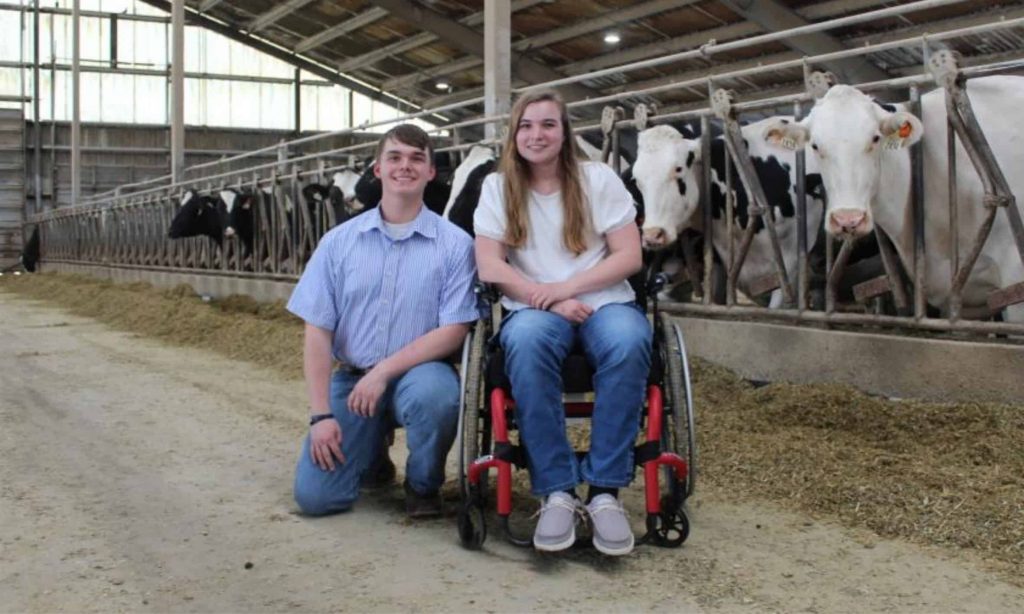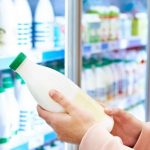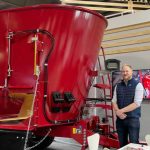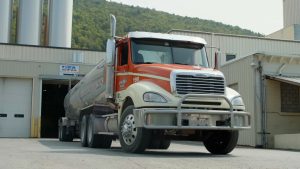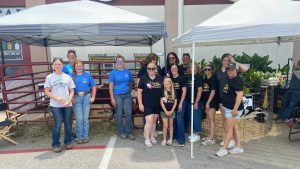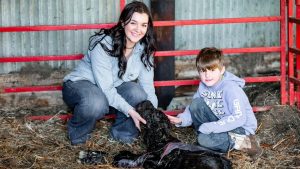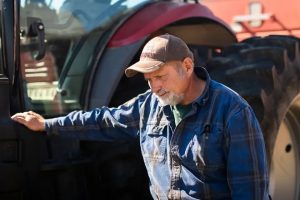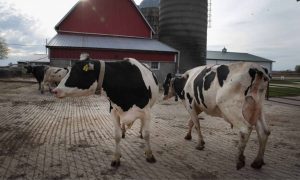
Sydni Mell and her brother Sam, both who grew up on a southern Wisconsin dairy farm, understand that statistic all too well.
Like many farm kids, the brother-sister duo grew up being part of the workforce on their family’s 200-cow dairy near DeForest. Sydni was very active on the farm, in FFA and showing cattle and now is studying dairy science at the University of Wisconsin-Madison. Her life literally flipped over when she came home to the family farm for Easter weekend in 2021.
“I was feeding calves with my brother and a friend and then Sam and I went up to the bunkers to cut some tarp and I had an accident and I fell off the bunker,” she shares, although she notes she doesn’t have any recollection of the accident.
After a long stent in the ICU and after a five-hour back surgery, Sydni remains paralyzed from the waist down.
“Really, I didn’t think this would happen to me,” she says. “I don’t think anyone does.”
Sydni has put in hard work and long hours to be able to return to college, using her wheelchair. She credits having a big support system and a great ag community that has inspired her to push forward.
“Just having the ag community behind me and hearing all their words of encouragement is wonderful,” she recently shared with Karen Endres, the farmer wellness program coordinator with the Wisconsin Farm Center on their Rural Realities podcast.
Community Impact
Sydni helped raise more than $3,000 for AgrAbility of Wisconsin, which helps farmers and their families living with a farm injury, disability or limitation.
“This organization gives me so much hope,” she says.
Thinking back to the accident, Sydni shared that farming can be a dangerous occupation and often focusing on what needs to get done combined with the routine of chores can have consequences.
“I forgot about the risks because I was on the bunker all the time” she says. “Just because you do it every day doesn’t mean it’s always going to be safe and that there are risks.”
The young college student says she often thinks back to what happened on that April day, but her focus is directed to her future. One that she says will include cows.
“It will definitely include cows,” she says. “I’m either going back to the farm or finding a job in the dairy industry.”
Wake-Up Call
Another thing that Sydni is certain about is the value of good friendships, which was illustrated greatly during the farming accident.
“Really just having people stick by you,” she says. “Especially family who supported me and friends that helped me navigate college.”
Sam, who was on the other side of the bunker the day of the accident, didn’t see all that happened to his sister, but quickly jumped into action, helping unravel her from the plastic and calling for help.
Now a junior in high school, Sam is also involved on the farm and in FFA, shared that before the accident he didn’t think twice about risks on the farm, but now ever since he does. He also echoes his sister’s sentiments about the love and appreciation for a great farming community.
“From the day it happened still to now, we had different farms offering to help,” he shares and says people checked in, helped with yard work and whatever was needed to help out.
His sister’s accident has been a wake-up call for Sam, as he shared that he looks at life differently now and accesses potential risks more now than ever before.
“I didn’t really look at the risks as much as I’d like to say before the accident,” he says. “Looking at the community showing their support, that they’re behind us the whole way is appreciated.”
The World Isn’t Built for Wheels
Sydni shared that she never noticed where the elevators were, but now adapting to a life that requires a different mode of getting around has been an adjustment.
“Even going up to the barn which requires rolling up a hill on a gravel driveway is difficult,” she says. “So, getting up there, I’m going to probably always need help because even with the motorized wheelchair, the gravel can make the wheels spin and I need someone to push me.”
Back on campus, Sydni needs help getting over snowbanks in Madison and on a recent trip to Seattle, Washington with the UW Collegiate Farm Bureau, she shared they went to a restaurant that had stairs.
“One of the senior guys had to pick me up and carry me up two flights of stairs because their elevator was broken,” she recalls. “That was really hard, like most farmers I have this stubborn personality and want to do everything for myself but now there is no way I can”
Although Sydni notes that through AgrAbility she has seen how technology and accessibility are going hand in hand at the farm level.
“Through AgrAbility I have seen a lot,” she shares that various equipment can be handicap accessible modified.
“Working cattle is always the hard part. I haven’t really figured that out,” she notes, but says that as time goes on, everything is likely to become more accessible.
To listen to the entire podcast of Sydni and Sam recalling the accident and sharing lessons learned, click on Farm Life Helped Teen Adapt After Tragedy (buzzsprout.com)
For more mental health stories:
